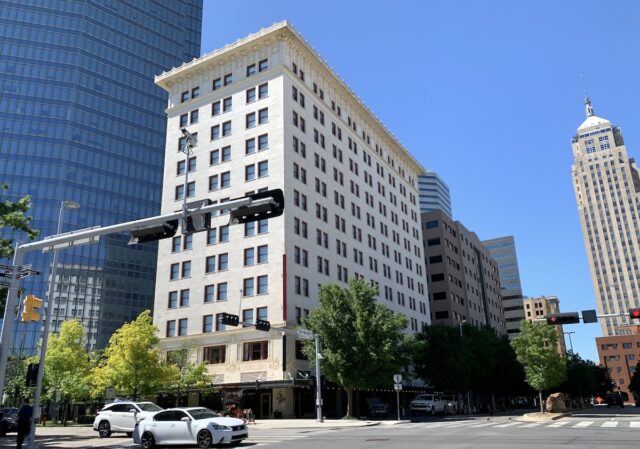Voters will be asked to hike Oklahoma City’s hotel occupancy tax from 5.5 percent to 9.25 percent if the City Council approves an election for later this year.
On Tuesday, the OKC City Council voted 7-0 to introduce the ordinance, which is scheduled to have a public hearing May 14. The council’s final vote to propose a citywide election would follow May 21. If an election is approved, the ballot question would go before voters Aug. 27, OKC city manager Craig Freeman said.
Currently, those who stay in OKC hotels and motels pay a 5.5 percent tax. That rate was last increased in 2004 after being at 2 percent since it was introduced in 1972. While the new hotel tax rate would be 9.25 percent, that does not include 4.5 percent in state sales tax and 4.1 percent city sales tax added to each stay. If the new rate is approved, the total tax on a hotel room for a visitor to OKC would be 17.8 percent.
“We haven’t had an increase in the hotel-motel tax in about 20 years,” Freeman told the council Tuesday. “The largest portion of this increase is focused on marketing and promotion of conventions and tourism. We are targeting about $500,000 a year that would be set aside to fund capital improvements at the convention center, and this is a little bit north of that, but it is to have a source that is there. This would likely not be the only source of funding, but it would help us keep up with capital improvements.”
OKC’s only other increase in the hotel-motel tax came in 2004 when voters approved the proposal with about 90 percent support.
If approved, officials said the increase would bring OKC’s total rate — including the occupancy tax and sales tax — in line with regional peer cities. Tulsa’s total rate is 16.52 percent, while Kansas City’s is 18.35 percent. Memphis has among the highest total rates, with 19.75 percent in taxes for those who stay in hotels there. Dallas has a 9 percent hotel occupancy tax, not including city sales tax.
Zac Craig, the president of Visit OKC, told the council that an increase is overdue.
“This is something that we’ve been discussing for years,” he said. “It even predates the groundbreaking for our beautiful convention center. We can go back to 2017 and 2018 and see the need for this. I have spoken with a lot of our key hotel stakeholders, and they certainly saw the importance then, and they see it now. I would say the vast majority of them are supportive of this initiative.”
Craig emphasized to the council that only the hotel occupancy tax would change if approved by voters.
“I want to make it crystal clear that this is not an increase in sales tax,” he said. “This is an increase in the hotel occupancy tax that is predominantly paid by visitors when they come and experience Oklahoma City.”
But the way OKC’s hotel tax is spent would also change under the proposal, with 75 percent going to promote tourism and 13 percent designated for an event sponsorship fund. A further 6.7 percent would go to the State Fairgrounds for capital improvements, and 5 percent would be devoted to capital improvements on the city’s new convention center.
Currently, about 55 percent of the hotel occupancy tax goes to the fairgrounds, 36 percent goes to tourism promotion, and 9 percent goes to event sponsorships.
Craig said the sponsorship fund in particular needs a boost in order to fully leverage amenities like Riversport OKC.
“You think about the festivals and events and so many things we could do with our infrastructure,” Craig said. “In my opinion, this is first-tier city infrastructure. When you think about the SEC and Big 12 championships and NAIA events and festivals, and all of the other things we could do with this infrastructure, those things take financial incentives. Unfortunately, that fund has been maximized, so there is not ample opportunity out there as it rests now to deliver those results.”
Ward 7 Councilwoman Nikki Nice questioned the decision to provide capital improvement money for the convention center and fairgrounds, while other items remain underfunded.
“I see that we found a creative way to create additional ways of capital improvements for those particular facilities, but we still have quite a few other facilities that still stand in the gap,” Nice said. “I guess my concern is that we are picking out two particular places or public facilities, and yes, I know these places are an attraction, but we are trying to bring a couple of MAPS 4 projects — one in particular, the Clara Luper Center — online, but we aren’t able to find extra funding for it.”
Later in Tuesday’s meeting, Ward 8 Councilman Mark Stonecipher cited the former Myriad Convention Center and what happened to it as a good reason to make sure the OKC Convention Center is properly funded for capital improvements when they are needed.
“I think these discussions are healthy and good,” he said. “When you look at the OKC Convention Center, I always think back to the Myriad and when we developed that and how we didn’t have adequate funds to maintain it or make capital improvements, so it kind of fell into disrepair. The new convention center is a big investment to me, and there is a need to maintain it.”
OKC is not the only metro city considering a hike in its hotel and motel tax. On June 18, residents of Edmond will vote on a proposed hotel and motel tax increase that would raise the rate from 4 percent to 6 percent.

OKC sales tax collections rise
April sales tax collections for OKC were up over the same period last year and exceeded projections heading into the month, according to a city press release.
General sales tax fund collections for April 2024 were $26.4 million, about $1.2 million above the projected amount and about $823,000 ahead of the same month last year. Use tax collections, which often fluctuate, were about $8 million for April, which slightly exceeded the projections.
Sales tax comes from retail sales in Oklahoma City. Use tax is charged at the same rate and comes from goods purchased elsewhere and shipped or brought to OKC, such as Amazon purchases or equipment not available from Oklahoma suppliers.
Regional Transit Authority to host engagement events
The Regional Transit Authority of Central Oklahoma is preparing for another round of town halls to share information and updates regarding the study of the RTA’s “west” and “airport” corridors.
The events include a virtual town hall, three pop-up sessions and a survey. The first session, a virtual town hall, will be held from 6 to 7:30 p.m. Tuesday, May 14, on Zoom. That meeting can be accessed by clicking clicking here.
Then, a pop-up session is set be held from 8 a.m. to noon on Wednesday, May 15, at the EMBARK Downtown Transit Hub and from 8 a.m. to noon on Friday, May 17, at the EMBARK Reno Mini Hub. A final session will be held from 9 a.m. to 1 p.m. on Saturday, May 18, at Scissortail Farmer’s Market.
In 2021, the RTA identified the airport and west corridors as priorities in its updated system plan, which can be read here. The survey will be available on RTAMoves.com between May 15 and May 31.






















